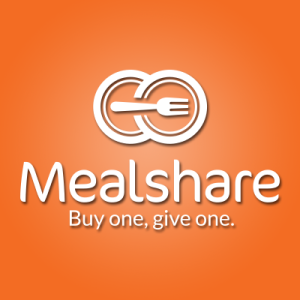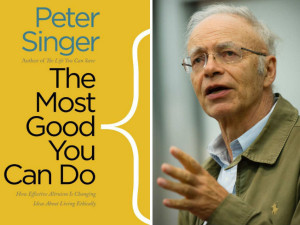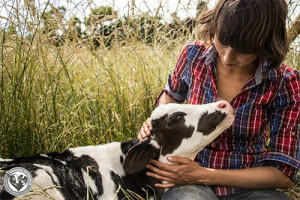 It’s 2016 and I’ve got some thoughts about resolutions and such, namely that this year I want to be more mindful and intentional about where my charitable dollars and energy go. First though, let’s lay some groundwork for a larger discussion of effective altruism by talking about one big bugbear of many vegans – derailing tactics.
It’s 2016 and I’ve got some thoughts about resolutions and such, namely that this year I want to be more mindful and intentional about where my charitable dollars and energy go. First though, let’s lay some groundwork for a larger discussion of effective altruism by talking about one big bugbear of many vegans – derailing tactics.
One common way in which people try to derail vegans advocating for change is to yell loudly, “Why do you care so much about animals when there are starving people everywhere!?”
Ah, my omnivorous friends, that’s because all vegans love fluffy kittens and hate human babies, and therefore do nothing to help their fellow humans.
Oh, wait.
While veganism isn’t a surefire way to solve all of the world’s ills, it certainly goes a long way towards helping.
Consider for a minute how:
- Animal agriculture is one of, if not the, biggest contributors to catastrophic climate change.
- The animal agriculture industry has been linked to profound adverse psychological and physical effects in people working in the industry.
- Consumption of animal-derived products has a significant adverse effect on human health.
- Animal-derived foods are a terribly inefficient way to feed people, wasting land, water and other resources.
- The use of prophylactic antibiotics in animal agriculture is a major factor in disturbing increases in antibiotic resistance.
Effective Altruism – veganism and the environment
Animal agriculture is a major cause of climate change, with some reports stating that over half of all greenhouse gas emissions are a result of livestock production. So, even if you hate cows, surely your love of yourself and (maybe) a few other humans or your dog is reason enough to stop eating steak. Especially as the clear-cutting and decimation of huge swaths of land caused by animal agriculture has been shown by numerous studies to have a massive impact on humans, both those displaced by industry or otherwise affected locally (such as through pollution) and for all of us worldwide (through climate change).
It makes no sense at all to use all this land and water to grow massive amounts of food that then gets used to fatten up a single animal. Instead, all that food could go directly to humans. Experts on world hunger and food sustainability are all too aware that it is impossible to feed everyone if meat and dairy remain dietary staples.
Effective altruism – veganism, health, and antibiotic resistance
There is mounting evidence of the link between antibiotic resistance and the overuse of antibiotics in animal agriculture to keep livestock productive at any cost. This means that we are increasingly vulnerable to diseases that were once easily treated. And, of course, those who are impacted the most are those who can’t afford or access alternatives to standard antibiotics.
Time and again, studies have found significantly worse health, both physical and emotional, in people working in the horrific meat and dairy industries, with high rates of suicide, homicide and domestic violence.
These industries also disproportionately employ migrant workers and racial minorities, treating the bodies of these people as disposable, just like the animals on those production lines. This is a fascinating, disturbing and growing area of research, with the 2015 honors thesis I just linked to (“Killing for a Living: Psychological and Physiological Effects of Alienation of Food Production on Slaughterhouse Workers” by Anna Dorovskikh) on my to-read list this week.
And, of course, the negative impact of animal-derived foods on human health has been shown time and again, to the point where even the World Health Organization finally had to take a stand in 2015 and list meat as a carcinogen (cause of cancer).
Overview of the Impact of Veganism
So, while choosing to make a delicious chickpea stew instead of going out and shooting a cow for dinner has a clear and immediate impact on the life of an animal, it is worth noting all of the ways in which that decision also affects our fellow humans (and other animals on the earth and in the oceans, seas and skies).
I don’t believe we can all suddenly become perfectly ethical creatures, nor that we will end up living in some utopia where we all share the same ethics and practices, but to accuse vegans of not caring about people is to miss the point. If anything, by appreciating the value of an animal’s life and wanting to avoid partaking in the oppression of that animal, it becomes easier to start seeing oppression elsewhere.
Do Vegans Have More Empathy?
Yes! Apparently.
This idea is supported by a number of studies (including this one), where vegans seem to be more compassionate than non-vegans. Perhaps veganism tends to foster greater compassion simply because people who adopt a vegan lifestyle are already demonstrating an ability to put the basic needs of others before their own desires (a self-fulfilling prophecy).
I think it goes beyond that though, as veganism can lift a heavy emotional weight borne of guilt that then frees us to engage in endeavours that help our fellow humans. For me, veganism is the cornerstone of effective altruism, providing a stark reminder of how seemingly personal choices actually have a much wider impact on others and are not truly ‘personal’.
Veganism is not, of course, a shortcut to becoming an incredibly well-rounded advocate for all anti-oppressive causes, and many vegans (myself included) unconsciously (or consciously) engage in acts of oppression towards people based on race, gender, age, sexual orientation, income and other factors. This is why it’s such a good idea to seek out and listen to black vegans focused on the intersectionality of oppression, as well as queer vegans (hi!), older vegans and vegans living in poverty and in food deserts.
Recognition of and advocacy for one oppressed group (animals) can help us to recognise and advocate for others experiencing oppression, such as refugees, migrant workers, and the LGBTQ community, as well as to take a stand against oppression based on race, gender, age and socioeconomic status. This is not a given though, and the vegan movement certainly has its moments where the bodies of one oppressed group (say, women, and people who are black and/or Jewish) have been used in nefarious ways to promote veganism.
Intersectional Veganism – no ‘clean’ eating for me, thanks!
Mainstream veganism has consistently been portrayed as white, middle-class, able-bodied and skinny, ignoring the vast numbers of people who do not fit this supposed ideal and actually harming these people and further marginalising their voices. There’s a strange degree of guilt laid at the feet of fat vegans, poor vegans who don’t eat organic kale, and sick vegans or former vegans dealing with serious and/or niggling chronic health issues.
Although veganism isn’t a panacea for health woes, a healthy plant-based diet can significantly lower the risk of many diseases and conditions. Sick vegans do exist though, and there’s work to be done in the vegan community to address problems of stigmatisation and the terrible ‘clean’ food movement. We can’t ignore that veganism does present some challenges for health, especially for people who live in poverty, in a food desert without access to healthy plant foods, and to people struggling with other issues around food.
On the whole though, eating a vegan diet does help us avoid the many health challenges posed by meat and dairy. It can dramatically increase our intake of healthy fibre and phytonutrients, reduce our intake of unhealthy saturated fats and pro-inflammatory substances, and may, therefore, give us more energy, time and money to put back into our communities.
Veganism as default
I’d love to one day see veganism as the default way of living, and for anyone considering the use of an animal-derived product to take a moment to really evaluate the supposed need for that product. I believe this is possible for a large number of people, and I know that the results would be overwhelmingly positive, both for animals and for humans worldwide.
I think it’s important to realise, though, that the decision to go vegan is simply too much for many people to comprehend. As a community, we have an opportunity to be more encouraging, to offer easy solutions to problems and present alternatives when friends, family and colleagues honestly have no idea that, say, vegan shoes or wine or cheese exist. I’ve come to believe that every progressive movement needs its outliers to wave their placards and yell loudly to keep us on track, while the bulk of people in those movements work quietly at presenting meaningful change as less challenging, more easily achievable and less radical with small, steady steps. Few people want to be at a remove from most of their peers and, therefore, won’t choose what looks like a radical position (that’s why the outliers are outliers!).
This brings me to the original point of this post (!), the Mealshare scheme that is taking off in Canada.
Mealshare Vancouver – A great way to give back (with minimal effort!)
While checking social media this morning to see if there was an update for the opening of Meet on Main’s new Gastown location (mid-January – I’m so excited!), I saw their tweet saying that they are now part of the Mealshare program. This means that when you visit this vegan-friendly restaurant and order a tasty vegan kale caesar salad, Mealshare and Meet on Main work together to donate a meal to someone in need, often a child.
In Vancouver there are many restaurants that have signed up to Mealshare, with Meet on Main, the Acorn, Cartem’s Donuterie (one of the earliest to sign up, and makers of delicious vegan doughnuts!), and Jam Jar the most vegan-friendly options. Other restaurants, unfortunately, appear to only offer Mealshare options that include meat, dairy or sea creatures.
Given that most of us eat out sometimes, and are already looking to make our choices count when it comes to the ethics of food, it makes sense to make Mealshare part of your plan for the new year. And, if you’re in a restaurant and see the Mealshare logo beside a non-vegan dish, this is a great opportunity to have a thoughtful discussion about food choices and how veganism goes beyond non-human animals. You might also want to contact the restaurant in private to ask if they’d consider maximising their impact by including a vegan option in the program.
Effective Altruism – what it looks like for me
As you might have noted from this post, I’m a bit obsessed with the idea of effective altruism right now, largely because this is what drew me to veganism in the first place and it’s nice to finally have a tidy little term to wrap up my personal philosophy.
A desire to avoid partaking in any immediate cruelty to animals was the first step on my road to veganism, with Peter Singer’s Practical Ethics giving me a good grounding during the first year of my philosophy degree back in 2002. Then I began to understand the direct impact of animal products on human health and the indirect effects of animal exploitation on environmental health and human health. The links soon started forming between veganism, feminism, and intersectional oppression (racism, food poverty and so on), thanks in large part to Carol J. Adams and amazingly inspiring people like Dr. A. Breeze Harper of Sistah Vegan.
Peter Singer and Effective Altruism – the most good you can do
 With just over a decade of veganism under my belt I’ve come full circle, back to Peter Singer, with my holiday reading including his latest book, “The Most Good You Can Do.” I would highly recommend reading this, whether you’re vegan or not, and also giving a copy of the book to everyone you know. Seriously. The book offers a mix of simple, sound philosophy (that you don’t need a philosophy degree to understand!), as well as inspiring case studies about entrepreneurs and people with regular jobs who have worked out how to maximise their impact using the skills they have while living the life they want.
With just over a decade of veganism under my belt I’ve come full circle, back to Peter Singer, with my holiday reading including his latest book, “The Most Good You Can Do.” I would highly recommend reading this, whether you’re vegan or not, and also giving a copy of the book to everyone you know. Seriously. The book offers a mix of simple, sound philosophy (that you don’t need a philosophy degree to understand!), as well as inspiring case studies about entrepreneurs and people with regular jobs who have worked out how to maximise their impact using the skills they have while living the life they want.
This book helps to frame philanthropy and charity in such a way that I feel like any reader will then be better positioned to make good choices that actually steer them closer to living the life they want. While I think there is a need for straight-up altruism, most modern societies don’t currently work on this principle. Most of us have a ‘my oxygen mask first’ attitude towards life even when there is no actual imminent risk of death and are encouraged by the free market to think like this so we consume more goods and services.
The ‘Trap’ of Self-Care
More recently, I feel like the rise of ‘self-care’ in many progressive communities also falls into something of a trap; we consume and are consumed by the idea that we must look after ourselves first, often to the detriment of others, in order to be able to give back at some imagined later date.
While caregiver burnout is very real, I think there’s a danger in making a virtue of self-care. We begin to blame people for burning out (“you should take better care of yourself!”), rather than looking for ways to make it easier to have a steady, positive impact with manageable, minimal negative impact on our own lives.
Veganism seems like a stark example of this to me. If, for example, Steve, an omnivore, eats a steak for dinner, it is possible that this will make him feel rather satisfied and happy. It is definite that this meal makes a cow dead, likely after an unnaturally short and desperately unhappy life. Steve not eating a steak may reduce his happiness by a small amount, but it dramatically reduces the suffering and death of someone else (the cow; let’s call him Salvador). In this equation, it is important to note that a slight reduction in Steve’s happiness is not equivalent to Salvador’s life of anguish and untimely death.Veganism and Self-Denial
Yes, many people too often view charity and veganism as extreme acts of denial, which makes them harder for others to embrace. But it is a mistake, I think, to deny that there is some sacrifice involved in many acts of charity or in forgoing an ice cream made with dairy products. And, I think it is good to be able to be at peace with those small daily sacrifices and to actively consider their weight against the positive impact that sacrifice makes elsewhere. In fact, I see this as a preferred form of self-care, as what better way to grow as a person and become stronger and more caring than to actually feel good about how our choices impact others?
(Altruism is, of course, a tricky beast as there is almost always a positive psychological effect on the giver of a gift in addition to the positive effect on the person – human or nonhuman – who receives the gift.)
As such, it seems more important than ever to reframe these opportunities for doing the most good you can in a way that allows people to start to see how effective altruism can help you to feel good about your choices, both short- and long-term. In practice, this may mean choosing a vegan-friendly restaurant for your next lunch meeting; picking a vegan menu item that is a Mealshare participant; and using your social networking weight to let everyone you can know that sometimes the best thing you can do to feel good is to do something good for someone else.
 Want carbon-neutral webhosting with great customer service? Try DreamHost and use code 'Vegans' for a third off!
Want carbon-neutral webhosting with great customer service? Try DreamHost and use code 'Vegans' for a third off!




{ 0 comments… add one now }